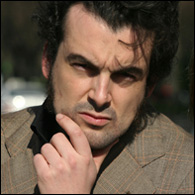

|
| home | movie reviews | features | sov horror | about | forum |
Q&A with Nacho Vigalondo (Timecrimes)
Though not yet a well-known director, Nacho Vigalondo has already begun to make an impression. He has directed a number of short films, including 2003's 7:35 de la mañana, which was nominated for the Academy Award that year. His first feature, Timecrimes, is a nifty little science-fiction thriller engineered around classic intellectualism rather than spaceships and spectacle. He sat down with us recently to talk about the film, its proposed American remake, and the differences between working in Hollywood and his native Spain. Question: How did you come up with the concept for this movie? Nacho Vigalondo: Really just by reading a lot of time-travel stories: short stories and novels by people like Philip K. Dick or Alfred Bester. I'm in love with those kind of authors. They're incredibly twisted and imaginative stories about things that can never happen in real life, but at the same time they talk about human nature with a freedom and an energy that you don't find anywhere else. I love science fiction, but I always felt that when these kind of stories are made into movies, the filmmakers become intimidated by the idea of challenging the audience. I wanted to make a movie that challenged the audience, but also to make it really funny, really fast, and really enjoyable. At the beginning, I thought this film should be really complicated and yet have only one character in only one location, taking place in real time. But by the fourth or fifth draft, the complexity of that started to feel a lot like masturbation: just proving to myself that I could pull off this stunt. So I went back and I added the notion of a girl in the woods, a naked girl. From that point, it became a crime story or a story about obsession, and the simplicity of it helped clarify what I wanted to talk about. Q: This is a science-fiction film, but it doesn't have -- nor does it need -- a lot of special effects. Is there a desire to do a more epic science fiction film, something a little more tied to spectacle? NV: There is some CGI in Timecrimes, but it's all photorealistic. Bárbara Goenaga, who plays the naked girl, she has some tattoos that we had to digitally remove. But I can promise that all of my projects are really, really cheap. (smiles) I feel very comfortable and safe with that level. And great filmmakers could do wonders with it. Look at Hitchcock and films like Psycho or Dial M for Murder. It's like performing magic tricks with nothing but a deck of cards. I like those kind of tricks, that kind of magic. Q: How did you find these actors? They're certainly not well known in the United States, but they're all very good. NV: This a movie with basically one actor -- Karra Elejalde, who plays Héctor. When you're making movies like this, you don't have the luxury of considering specific actors. When I was writing the script, the character was very abstract. But when Karra's name came up, I really couldn't think of anyone else who would work. He's very well known in Spain, but basically for doing comedies. He's done mostly comedies lately, and that's what people know him for. But back in the '90s, he did a lot of psycho-killer parts in films like La Madre Muerta [Death's Mother]. I loved the idea of making this character kind of funny, kind of an everyman, and yet he ends up doing some really horrible things. Karra has the ability to change himself like that from one role to the next. Now Bárbara, she's a rising star in Spain, and she's also a good friend. We've made some short movies together and I knew I wanted her here. She's a very naturalistic actor and very subtle. She doesn't feel like an actress, she feels very organic. Q: How much leeway do you give your actors when you work with them? Do you let them experiment at all? NV: In this case, the story is so complicated and the shooting schedule was so tight that we needed to be extremely clear about where we were going. You can get lost so easily, and I didn't want anyone to get confused or lose track of what was going on in the middle of the shoot. So we rehearsed for a long time and made sure we were all on the same page. Even then, we had some scary moments -- some moments when we weren't sure which version of Héctor we were shooting at the time. Karra was a godsend in that sense because he had to be Héctor 3 in the morning, Héctor 2 right after lunch, and Héctor 1 in the afternoon, all in one day. He hit it perfectly every time. He always knew which Héctor he was. Q: And it does feel very Spanish -- very full of Spanish sensibilities. NV: There's something funny about that. In Spain, part of the audience felt upset with the character because he's so close to the Spanish way of thinking and behaving. They weren't seeing a movie actor in a time-travel movie, they were seeing their father or their brother. Here in the U.S., it's been very different. They're viewing it from a different perspective and they're not seeing the same... subtleties. Q: This is your first feature film, but you've made a number of short films. What's the difference between the two in terms of your approach? NV: It's about energy. One day of shooting for a short film is as hard as one day of shooting for a feature film. The difference is, with a short film you're only shooting for five days. With a feature film, you have to shoot for one or two months with the same level of energy. Working all the time. That gets complicated and it can present some serious challenges. Q: You've got the film now and not only is it getting American distribution, it's getting a Hollywood remake. Did you think about that when you were making it or did you try to stay focused on a Spanish audience? NV: We actually secured American distribution first, even before we found Spanish distribution. It was wonderful, because at the time I wasn't sure if the film was even going to be seen at all. I always thought of this film as a cult film, a midnight film, and it means so much for it to be getting some American exposure. For me, it's not difficult to picture myself making movies here. It's still too early to know if I'm going to have an American project myself, but it seems like it's going to come sooner rather than later. Q: What do you know about the American remake of Timecrimes? NV: I know that United Artists is going to produce it. Tim Sexton is going to be the writer: he did this amazing film, Children of Men, a few years ago. Yesterday, I had the script of the remake in my hands, though I haven't read it. Q: Anything about the director? I'd heard David Cronenberg was attached. NV: I don't know. David Cronenberg was one of the names attached in the beginning. I saw the list of directors they're talking to about this film. It's an incredible list, but I can't drop any names or else I'll be in big trouble. I'm glad that American audiences will get a chance to see both films. It's so strange for a movie like this to be in theaters. You know, people are always skeptical about remakes: they always prefer the original. But when you're a filmmaker and it happens to you, it's so cool. Especially if it's your first film that's being remade. Maybe if it was my fifth or sixth film, I might feel differently about it, but with this film, it really feels like an honor. I'd love to see Bruce Willis do this. He's the right age and has the right bearing. And he's already done a time-travel movie, so he knows the ropes! Article published 12.18.2008. Read Rob Vaux's review of Timecrimes.
|


|
| home | movie reviews | features | sov horror | about | forum |
| This site was previously at flipsidemovies.com from 2000 to 2008. |
|
contact | copyright | privacy | links | sitemap
Flipside Movie Emporium (FlipsideArchive.com)
|